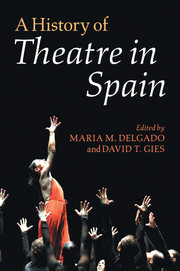Book contents
- Frontmatter
- Contents
- Illustrations
- Contributors
- Acknowledgements
- Introduction
- 1 The challenges of historiography
- 2 Lope de Vega, Calderón de la Barca and Tirso de Molina
- 3 The world as a stage
- 4 Playing the palace
- 5 The art of the actor, 1565–1833
- 6 Theatrical infrastructures, dramatic production and performance, 1700–1759
- 7 Popular theatre and the Spanish stage, 1737–1798
- 8 Theatre of the elites, neoclassicism and the Enlightenment, 1750–1808
- 9 Actors and agency in the modern era, 1801–2010
- 10 Zarzuela
- 11 Nineteenth-century Spanish theatre
- 12 Copyright, buildings, spaces and the nineteenth-century stage
- 13 Modernism and the avant-garde in fin-de-siècle Barcelona and Madrid
- 14 Continuity and innovation in Spanish theatre, 1900–1936
- 15 Theatrical activities during the Spanish Civil War, 1936–1939
- 16 Theatre, colonialism, exile and the Americas
- 17 Theatre under Franco (1939–1975)
- 18 Flamenco
- 19 Nationalism, identity and the theatre across the Spanish state in the democratic era, 1975–2010
- 20 Directors and the Spanish stage, 1823–2010
- 21 This evolution is still ongoing
- 22 Theatre as a process of discovery
- 23 Theatre is the art of the future
- Select bibliography
- Index
- References
17 - Theatre under Franco (1939–1975)
Censorship, playwriting and performance
Published online by Cambridge University Press: 05 June 2012
- Frontmatter
- Contents
- Illustrations
- Contributors
- Acknowledgements
- Introduction
- 1 The challenges of historiography
- 2 Lope de Vega, Calderón de la Barca and Tirso de Molina
- 3 The world as a stage
- 4 Playing the palace
- 5 The art of the actor, 1565–1833
- 6 Theatrical infrastructures, dramatic production and performance, 1700–1759
- 7 Popular theatre and the Spanish stage, 1737–1798
- 8 Theatre of the elites, neoclassicism and the Enlightenment, 1750–1808
- 9 Actors and agency in the modern era, 1801–2010
- 10 Zarzuela
- 11 Nineteenth-century Spanish theatre
- 12 Copyright, buildings, spaces and the nineteenth-century stage
- 13 Modernism and the avant-garde in fin-de-siècle Barcelona and Madrid
- 14 Continuity and innovation in Spanish theatre, 1900–1936
- 15 Theatrical activities during the Spanish Civil War, 1936–1939
- 16 Theatre, colonialism, exile and the Americas
- 17 Theatre under Franco (1939–1975)
- 18 Flamenco
- 19 Nationalism, identity and the theatre across the Spanish state in the democratic era, 1975–2010
- 20 Directors and the Spanish stage, 1823–2010
- 21 This evolution is still ongoing
- 22 Theatre as a process of discovery
- 23 Theatre is the art of the future
- Select bibliography
- Index
- References
Summary
This precisely defined cultural period is protracted simply because it lasted so long in political terms: from 31 March 1939, the date by which all of the country was in Nationalist hands, until the death of General Franco on 20 November 1975. Yet a monolithic notion of Francoism serves to conceal different ideologies and changes in policy. George Orwell was both right and wrong to hope that fascism in Spain would take ‘a comparatively loose and bearable form’. Francoism was bearable in the sense that it endured, but, far from being merely loose ideologically, it was not consistently fascist.
On 20 November 1939, the body of José Antonio Primo de Rivera was exhumed and carried on a journey of ten days and ten nights to El Escorial, the sixteenth-century complex where the majority of Spanish monarchs are buried. José Antonio had been the founder of the Spanish fascist party, the Falange, and was murdered at the beginning of the Civil War. This tribute to him was a choreographed, nationwide operation, involving thousands of participants in a new memorialising liturgy with the presence of the air force, torch-light processions, and hands raised in the fascist salute. It was a spectacle with which the thirteen Madrid theatres functioning in 1939 could not compete. But it also signalled a form of burial for Spanish fascism. The Falange had already been diluted by Franco in 1937 through the incorporation of Carlists (traditionalists originally seeking a different branch of the Bourbon family on the throne), and, two years later, others who had supported the victorious army took part in the struggle for influence in the Francoist hierarchy: among them, monarchists, conservatives, the Catholic Church, and elements from the military. It was this confusion of voices which would find expression in the official ideology and culture of the period.
- Type
- Chapter
- Information
- A History of Theatre in Spain , pp. 341 - 371Publisher: Cambridge University PressPrint publication year: 2012
References
- 3
- Cited by



